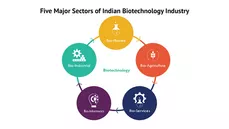
The biotech sector has become a key sector in India. Its potential to contribute to the country's economic growth and to increase the economic prosperity and health awareness of a population of more than one billion people is enormous. With over 2,700 biotech startups and more than 2,500 biotech companies, the country offers a genuinely cutting-edge and entrepreneurial ecosystem.

Biotechnology has played a major role in the developments of food and agriculture, nutrition, health care, environment, and industrial growth in India. The biotech sector comprises five main segments: Biopharma, Bio-Agriculture, Bio-Industrial, Bio-IT and Bio-Services, which consists of the fields of Clinical Research Organizations and Research Services.
Biopharmaceuticals generated the largest share of total revenue in the Indian biotech industry in 2019, accounting for about 62 percent. It is followed by bio-services at 18 percent and bio-agriculture at 14 percent. Indian bio-services is poised to become a leading destination for clinical trials, contract research, and manufacturing activities.
Applicant run on an unstoppably growing sector
India has 665 plants in the U.S., which are approved by the Food and Drug Association. The country accounts for 44 percent of the world's abbreviated new drug applications and more than 1,400 WHO-compliant manufacturing facilities.
India is the largest producer of the recombinant hepatitis B vaccine. As a leading supplier of diphtheria, pertussis and tetanus vaccines, as well as Bacillus Calmette-Guérin and measles vaccines – and as the provider of 70 percent of WHO vaccines – India also plays a key role in the global vaccine market. Considering India's strengths and potential, it is ranked 48th on the Global Innovation Index. All these activities and achievements place the country among the world's top twelve locations, accounting for approximately three percent of the global biotechnology industry.
Forecasters predict the Indian biotech industry will be worth $150 billion by 2025, up from $70 billion in 2020. Given the massive size of the industry, a large number of science graduates are interested in getting their foot in the door of the lucrative biotech market and either working for a biotech company or staying in academia and moving towards further research.
Government initiatives pave the way for innovating biotech solutions
The Department of Biotechnology (DBT) of the Indian Ministry of Science and Technology is one of the first biotechnology departments in the world established by a government body. Its focus is on developing innovative solutions to development challenges. The DBT has a record of great success in research. These range from preventing and curing major diseases to addressing the challenges of improved agricultural productivity, developing innovative solutions for national nutritional needs and a clean environment.

The DBT has been leading the way in breakthrough biotechnology research through the establishment of a Biotechnology Industry Research Assistance Council (BIRAC). Its goal is to strengthen and empower emerging biotechnology companies to conduct strategic research and innovation. BIRAC aims to guide these companies from idea generation to the launch of products and technologies. The DBT and BIRAC have already established several collaborative research and development programs with various countries and philanthropic organizations in different areas of biotechnology.
Establishing the infrastructure to speed up commercialization of new technologies
The government has been pushing for the establishment of business incubators and life science clusters. Moreover, there are nine biotechnology parks and four biotechnology science clusters across India. The 2021/22 budget for the DBT is 35 billion Indian rupees – a 25% increase over the 2020/21 budget. With the new budget, India has prioritized new research startups, biotechnology and health. Research parks were built to accelerate the commercialization of new technologies, support emerging companies, and help new companies collaborate with other players in the biotechnology sector – including academia and government.
The Indian biotechnology sector has been built on entrepreneurship, innovation and ongoing domestic talent. With the increase in biotech incubators, the aim is that in turn, research will be boosted and the growth of startups will be encouraged.
Industry and academia promote biotech initiatives
The Department of Biotechnology has been instrumental in advancing the biotechnology sector in India by aligning its work with India's growth agenda and developing innovative solutions to country-specific challenges. Key initiatives include Swasth Bharat (Healthy India), Ayushman Bharat (Long-life India), Swatch Bharat (Clean India), Poshaan Abhiyan (National Nutrition Mission), Start-up India, Make in India and Skill India. An example of such a DBT project is the National Biopharma Mission program launched in 2017 with the slogan Innovate in India. It aims to bring industry and academia together to promote entrepreneurship and indigenous manufacturing in the biopharma sector.

The Indian National Research Foundation (NRF) has specifically allocated research funding for biotechnology research for academic researchers. Most research and development in India is carried out in national laboratories, institutes of science and technology, and the central university system. However, the government has yet to decide whether the NRF will be integrated into the Ministry of Science and Technology or become a stand-alone institution.
The German Research Foundation (DFG) is also looking forward to the establishment of the NRF in India, as it is expected to boost research in universities across India and train future scientists. DFG is collaborating with various government institutions such as the Department of Science and Technology, the Department of Biotechnology, the Indian National Science Academy, and research councils under the Ministry of Human Resource Development. For the DFG, this could pave the way for a new cooperation opportunity: After all, the internationalization of the Indian research system could be pushed even further - and this would provide TUM with a good opportunity to engage in the dynamic and promising biotech sector in India.
Sources:
- https://www.makeinindia.com/sector/biotechnology
- http://dbtindia.gov.in/about-us/introduction
- https://www.ibef.org/industry/biotechnology-india.aspx
- https://www.investindia.gov.in/sector/biotechnology
- https://www.orfonline.org/expert-speak/transforming-biotech-innovation-ecosystem/
- https://science.thewire.in/the-sciences/budget-big-bang-deals-for-st-but-scientists-still-worried-about-older-problems/
- https://cen.acs.org/policy/research-funding/India-prioritizes-new-research-foundation-biotech-and-health-in-new-budget/99/web/2021/03